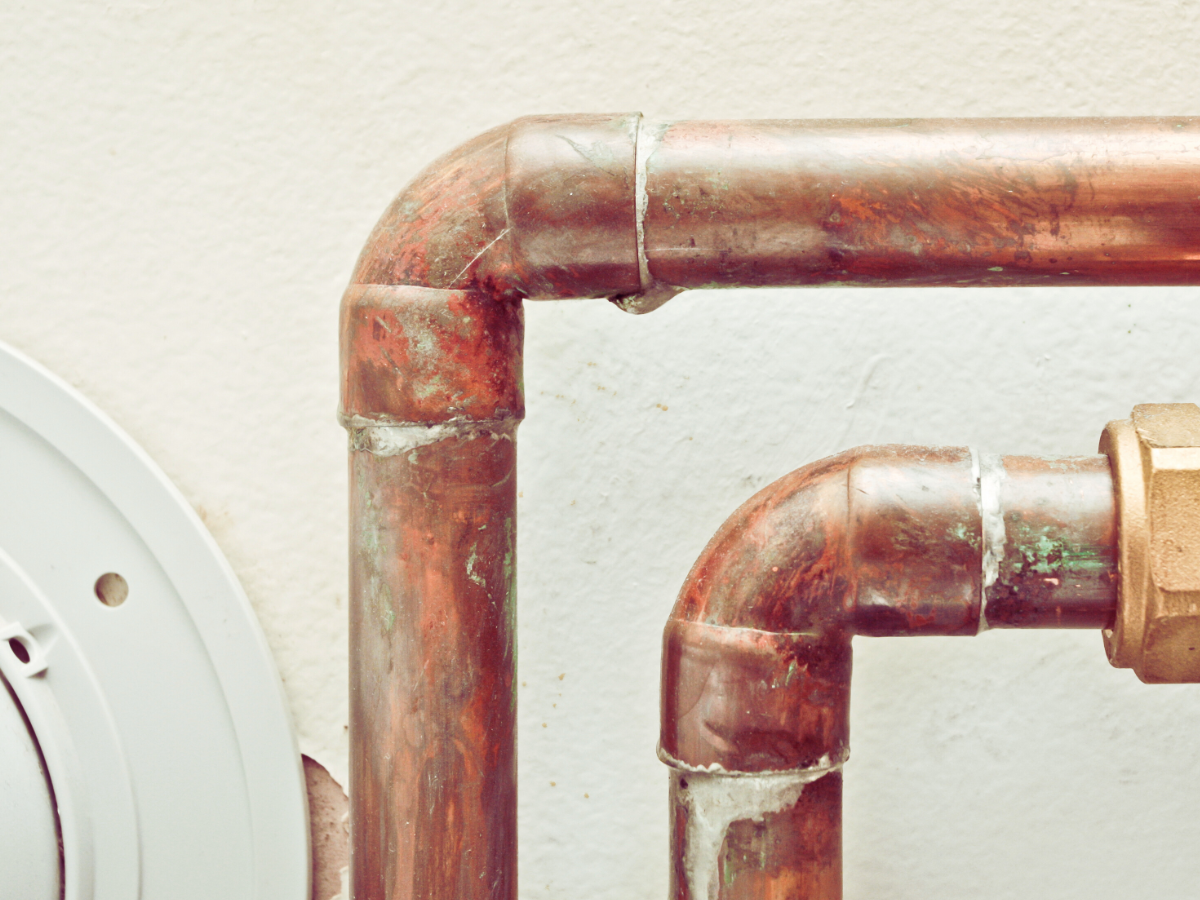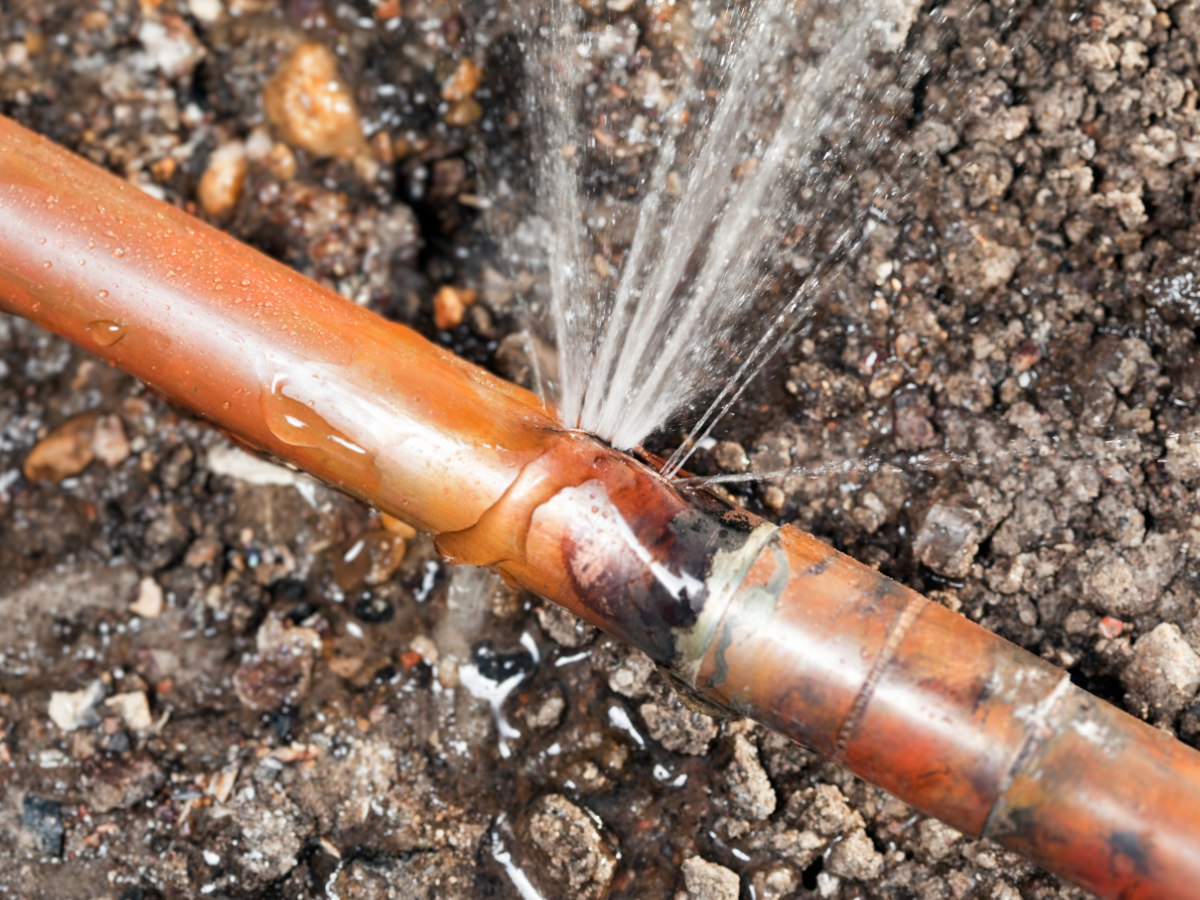 Copper has been a key material in plumbing for as long as plumbing has existed. Not only is it abundant and easy to work with, but it’s usually considered extremely durable and corrosion-resistant. In favorable conditions, it can practically last a lifetime.
Copper has been a key material in plumbing for as long as plumbing has existed. Not only is it abundant and easy to work with, but it’s usually considered extremely durable and corrosion-resistant. In favorable conditions, it can practically last a lifetime.
When the massive housing boom began following World War II, copper quickly became the standard choice for piping. Many of the plumbing systems installed in those decades are still in place today — so why are so many copper pipes failing in coastal Florida?
From pinhole leaks to salt air pipe damage, Florida plumbing issues have been steadily on the rise for years. Let’s find out why.
Coastal Climate and Its Corrosive Effects
Corrosion. It’s the sworn enemy of plumbing systems the world over, but isn’t copper supposed to be resistant to such wear and tear? As it turns out, it’s complicated.
While you won’t catch copper pipe rusting like cast iron or galvanized steel, it’s still susceptible to certain forms of corrosion. In particular, the surface of the metal oxidizes over time, eventually forming a patina.
This usually doesn’t compromise the integrity of the metal itself, but several unique factors make the climate in Bradenton, FL especially hard on copper. The first is salt air corrosion. This happens when onshore winds blow in briny air from the ocean, exposing pipes to highly corrosive salt particles.
Another major issue is coastal humidity plumbing damage. The hot, humid weather in coastal Florida often causes moisture to condense on pipes, creating a perfect environment for mold and other damaging microorganisms to thrive.
Aggressive Water Chemistry
Water might be the stuff of life, but poor Florida water quality can be a death sentence for copper pipes. In areas with hard water, such as here in Bradenton, mineral scale buildup can be a big problem. As these deposits accumulate, they can create obstructions and increase the risk of pipe damage.
Because municipal water in Florida is frequently acidic, pH pipe corrosion is also a serious concern. High levels of chlorides only exacerbate acidic water damage, degrading the interior of copper plumbing and causing pitting. This, in turn, often leads to the formation of pinhole leaks.
Pinhole Leaks: The Early Sign of Failure
 It doesn’t take a burst pipe or a basement full of water for leaky plumbing to wreak havoc on your home. Tiny pipe leaks are a lot less dramatic, but they’re among the surest early signs of pipe failure.
It doesn’t take a burst pipe or a basement full of water for leaky plumbing to wreak havoc on your home. Tiny pipe leaks are a lot less dramatic, but they’re among the surest early signs of pipe failure.
Pinhole leaks in copper pipes form from pitting, which happens when small spots on the pipe’s inner wall corrode and weaken. When these spots eventually fail, they create tiny pinholes through which water can escape.
Unfortunately, pinhole leaks often go unnoticed until they’ve already caused significant damage. Not only are they very small, but they may only leak intermittently and in out-of-the-way places.
Poor Installation Practices Amplify the Problem
While copper is easy to work with, it’s also easily damaged by poor plumbing installation practices. This includes overheating, over-tightening, installing the wrong fittings or using too much flux on soldered joints.
Any of these issues can weaken the metal and leave it more vulnerable to oxidation. Without protective insulation, a copper pipe touching concrete will deteriorate much more quickly as well.
If your home’s electrical system is grounded to copper piping, it’s also critical to ensure the grounding is done properly. If not, any current flowing through the pipe could corrode the metal through a process called pipe electrolysis.
Electrolysis and Stray Current Corrosion
Electrolysis in plumbing, also known as electrolytic corrosion, is a process that happens when unwanted electrical currents pass through copper piping. The current pulls electrons out of the copper atoms, slowly breaking them down at the molecular level. This thins the walls of the pipe in certain areas, producing pitting and pinhole leaks.
This type of stray current corrosion happens most often in older homes with poorly grounded electrical systems. A related issue, mixed metal corrosion, can occur in plumbing systems with both copper and iron or galvanized steel components. Where these dissimilar metals touch, they can form galvanic cells that significantly accelerate the corrosion process.
Nearby Construction & Soil Disruption
Coastal areas are prime territory for development, which means things are always moving — including the soil. This can put added stress on copper pipes underground, as can natural soil corrosion. Copper breaks down more quickly in damp, acidic soil, which is common throughout Florida.
Another common problem in the Sunshine State? High water tables. Moisture is the enemy of underground plumbing, and we’ve got more than our share. Along the coast, saltwater intrusion from storm surges can also inflict major stormwater pipe damage.
What Homeowners Can Do
As with most things, it’s much easier to prevent pipe corrosion than to fix it after the fact. That’s why it’s essential to schedule a professional plumbing inspection in Florida every year. It’s a key part of copper pipe maintenance, and it’s the easiest way to catch problems early on. You should also keep an eye out for potential red flags like:
- Sudden spikes in your water bills
- Unexplained water spots or stains
- Low or inconsistent water pressure
- Damp, musty smells with no clear source
- Crusty, bluish-green corrosion on pipes or joints
Other preventive measures include testing your water chemistry and verifying that your electrical system and pipes are grounded correctly. A neutralizer system can help correct water that’s too acidic, while a water conditioner can reduce hardness and treat certain other contaminants.
Best Replacement Options for Bradenton, FL Homeowners
Worried your aging copper pipes are headed for trouble? Depending on the situation, you have a few available options.
Small, isolated leaks can often be fixed by soldering patches over the affected areas. To mend larger cracks and corroded spots, it may be necessary to cut out and replace sections of pipe. Basic pipe repairs usually cost a few hundred dollars, though complicated repairs in inaccessible areas can run much higher.
In cases of multiple leaks or severe, widespread corrosion, total replacement is often a better option. Repiping copper plumbing systems with more corrosion-resistant materials can cost several thousand dollars, but the long-term benefits are hard to argue. Along with saving money on water leaks, recurring repair costs and other expenses, repiping provides invaluable peace of mind.
Arguably the best plumbing material for coastal homes is PEX (cross-linked polyethylene). It’s cheap and easy to install, doesn’t rust or corrode and can last up to 50 years when properly installed and maintained. It also needs fewer joints, which means fewer places for leaks to develop.
Copper Pipes Failing in Coastal Florida? Call the Punctual Plumbers!
 Don’t let copper pipe corrosion wreck your plumbing system and threaten your property. Call the experienced professionals at Benjamin Franklin Plumbing for fast service and affordable solutions, including expert water line repair and replacement.
Don’t let copper pipe corrosion wreck your plumbing system and threaten your property. Call the experienced professionals at Benjamin Franklin Plumbing for fast service and affordable solutions, including expert water line repair and replacement.
We’re highly experienced in serving coastal homes throughout Bradenton, FL and surrounding areas, and we know what it takes to protect your plumbing from the elements.
FAQs
What causes copper pipes to corrode in Florida?
A variety of factors contribute to copper pipe corrosion, including salty sea air, high humidity, naturally acidic soil and aggressive water chemistry.
Is PEX better than copper for Florida homes?
Generally, yes. While its maximum lifespan is shorter than copper’s, it’s far more resistant to corrosion and less likely to develop pinhole leaks and other issues.
How long should copper pipes last in a coastal environment?
In ideal conditions, copper piping should be expected to survive for 50 to 70 years. Here on the coast, however, it’s not uncommon for pipes to start failing in half that time.
Can salt air really damage indoor plumbing?
Yes! Indoor pipes and water lines may be less exposed to the elements, but salt air can penetrate every nook and cranny of your home when you live near the coast.
How much does it cost to repipe a house in Florida?
Depending on the size of the house, the materials used and other factors, the cost of repiping can range from as little as $2,000 to as much as $15,000.